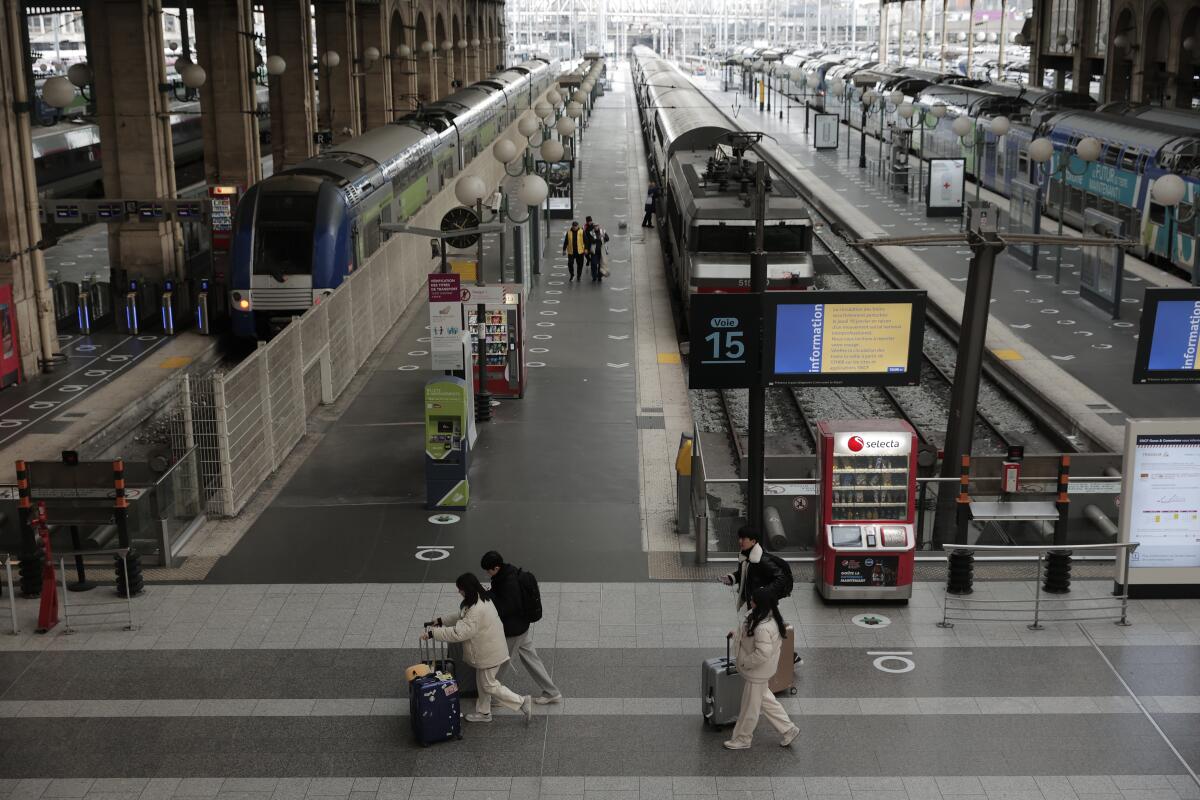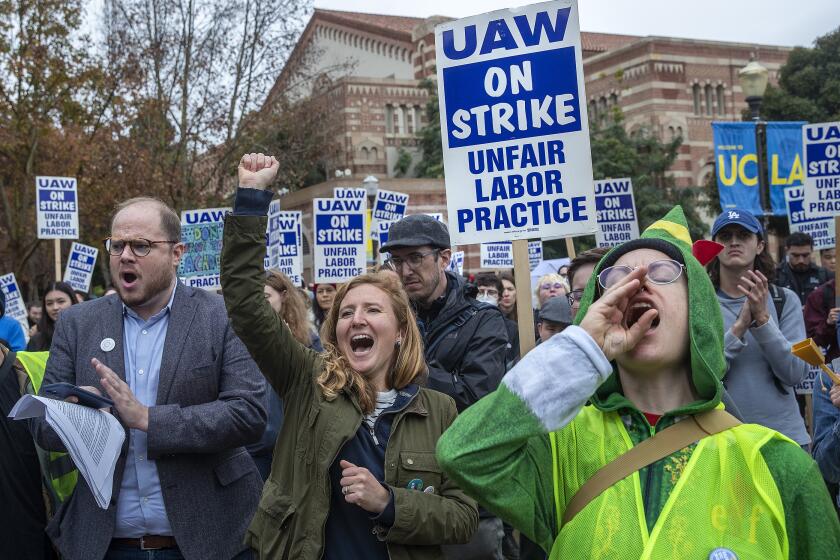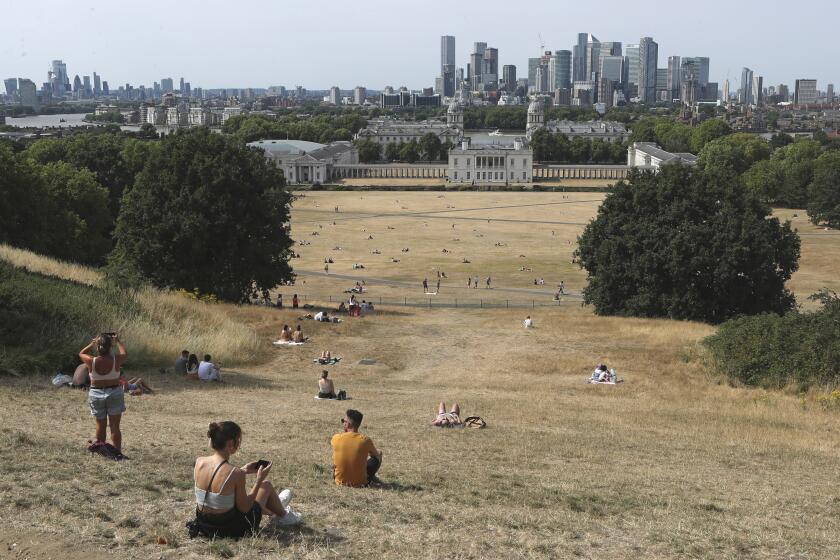Nationwide strikes and protests hit France over plan to raise retirement age

- Share via
PARIS — Hundreds of thousands took to the streets of Paris and other French cities Thursday to demonstrate against proposed pension changes that would raise the retirement age, amid a day of nationwide strikes and protests seen as a major test for President Emmanuel Macron.
Strikes severely disrupted transport, schools and other public services across the country.
French workers would have to work longer before receiving a pension under the new rules — with the nominal retirement age rising from 62 to 64. In a country with an aging population and growing life expectancy and where everyone receives a state pension, Macron’s government says the reform is the only way to keep the system solvent.
Unions argue that the pension overhaul threatens hard-fought rights, and propose a tax on the wealthy or more payroll contributions from employers to finance the pension system. Polls suggest that most French people also oppose the reform.
Macron vowed to press ahead with the changes. “We will do it with respect, in a spirit of dialogue but also determination and responsibility,” he said at a news conference at a French-Spanish summit in Barcelona.
More than 200 rallies were staged around France on Thursday, including a large one in Paris involving all of France’s major unions.
Jean Paul Cachina, 56, a worker in human resources, joined the march in the French capital — a first for him. “I am not here for myself,” he said. “I am here to defend the youth and workers doing demanding jobs. I work in the construction industry sector, and I’m a firsthand witness of the suffering of employees.”
The massive and successful strike by University of California academic workers has helped energize an unprecedented surge of labor organizing among their peers nationwide.
Many young people were among the Paris crowd, chanting: “The youth are protesting! Macron, you are finished!” High school student unions had urged members to join the protests.
Nathan Arsac, 19, a student and union member, said: “I’m afraid of what’s going to happen next. Losing our social achievements could happen so fast. I’m scared of the future when I’ll be older and have to retire.”
Sylvie Bechard, a 59-year-old nurse, said she joined the march because “we healthcare workers are physically exhausted. ... The only thing we have is demonstrating and to block the economy of the country.”
The economic cost of the strikes was not immediately clear. The government worries that a big show of resistance Thursday could encourage unions to continue with protracted walkouts that could hobble the economy just as France is struggling against inflation and trying to boost growth.
France awakens to an ecstatic Marine Le Pen after her party’s far-right candidates for parliament sent shock waves through the political establishment.
Police unions opposed to the retirement reform are also taking part, while those who are on duty are bracing for potential violence if extremist groups join the demonstrations.
A majority of trains around France were canceled, including some international connections, according to the SNCF rail authority. About 20% of flights out of Paris’ Orly Airport were canceled, and airlines warned of delays.
The ministry of National Education said some 34% to 42% of teachers were on strike.
Thierry Desassis, a retired teacher, called the government’s plan “an aberration.”
“It’s at 64 that you start having health problems. I’m 68 and in good health, but I’ve started seeing doctors more often,” he said.
Thousands of ambulance workers in Britain are staging a one-day strike, with unions and the government accusing each other of putting lives at risk.
The strike was also affecting some monuments. The Versailles Palace was closed Thursday, the Eiffel Tower warned of potential disruptions and the Louvre Museum said some exhibition rooms would remain closed.
Philippe Martinez, secretary general of the CGT union, urged Macron to “listen to the street.” Laurent Berger, head of the CFDT union, called the reform “unfair” and said: “There will be other action days.”
Many French workers expressed mixed feelings about the government’s plan and pointed to the complexity of the pension system.
Quentin Coelho, 27, a Red Cross employee, felt he had to work Thursday despite understanding “most of the strikers’ demands.” With an aging population in the country, he said, raising the retirement age “isn’t an efficient strategy. If we do it now, the government could decide to raise it further in 30 or 50 years from now. We can’t predict.”
Coelho said he doesn’t trust the government and is already saving money for his pension.
News Alerts
Get breaking news, investigations, analysis and more signature journalism from the Los Angeles Times in your inbox.
You may occasionally receive promotional content from the Los Angeles Times.
French Labor Minister Olivier Dussopt acknowledged that the pension plans had prompted “concerns” and that they would require “an additional effort” from workers. He called on strikers not to damage France’s economy.
“The right to strike is a freedom, but we do not want any blockades,” he said, speaking on LCI television.
Dussopt justified the decision to raise the retirement age because the government rejected other options involving tax rises — which he said would hurt the economy and cost jobs — or reducing pension amounts.
The French government is formally presenting the pension bill Monday, and it heads to Parliament next month. Its success will depend in part on the scale and duration of the strikes and protests.
Hiltzik: Greedy railroads are to blame for rail strike threat. Why should Congress help them?
The rail strike is looming because the railroads are refusing to give their workers paid sick days, even though they are swimming in profits. Congress should let workers use their leverage.
Most opposition parties, including the left and the far right, are strongly against the plan. Macron’s centrist alliance lost its parliamentary majority last year, yet still is the most important grouping in the National Assembly, where it has a good chance of being able to ally with the conservative Republicans party to approve the pension reforms.
The planned changes demand that workers must have worked for at least 43 years to be entitled to a full pension. For those who do not fulfill that condition, such as the many women who interrupted their career to raise their children or those who studied for a long time and started working late, the retirement age would remain unchanged at 67.
Those who started to work early, under the age of 20, and workers with major health issues would be allowed early retirement.
Protracted strikes met Macron’s last effort to raise the retirement age in 2019. He eventually withdrew it after the COVID-19 pandemic hit.
Heat waves and drought swept across much of Europe last summer, with the temperature in Britain rising above 104 degrees for the first time on record.
Retirement rules vary widely from country to country, making direct comparisons difficult. The official retirement age in the U.S. is now 67, and countries across Europe have been raising pension ages as populations grow older and fertility rates drop.
But opponents of Macron’s reform note that, under the French system, people are already required to work more years overall than in some neighboring countries to receive a full pension.
The plan is also seen by many as endangering the welfare state that’s central to French society.
More to Read
Sign up for Essential California
The most important California stories and recommendations in your inbox every morning.
You may occasionally receive promotional content from the Los Angeles Times.


















